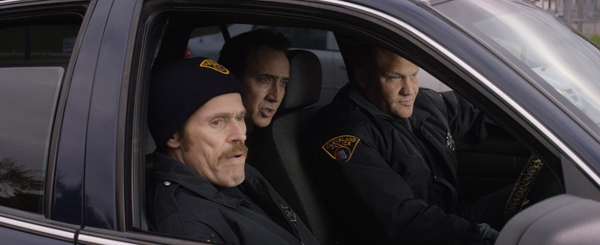
From left, Willem Dafoe, Nicolas Cage, and Christopher Matthew Cook in Dog Eat Dog (Toronto International Film Festival)
It’s sometimes captivating to see a filmmaker cut loose and not give a s*** anymore. That’s the vibe that is unmistakable in Paul Schrader’s adaptation of the 1997 novel by Edward Bunker (of Straight Time and Animal Factory fame and, as an actor, Mr. Blue from Reservoir Dogs notoriety). This may be easy to see why, considering his previous film. The final cut was taken away from him on Dying of the Light (also starring Nicolas Cage, and I think I was one of its few admirers, albeit in its cut-up state). This time around, he has decided to go for material that is simply scuzzy and without much concern for good taste.
The movie opens with Willem Dafoe as Mad Dog, crashing at some woman’s house and shooting up heroin in the bathroom. How he got there we sure don’t know, not when he proceeds, in the heat of the moment, to kill the woman and her teenage daughter, making you wonder if any main character can be this violent and crass. The sequence is blackly, sickly, and why-am-I-enjoying-this? funny, and this is all before the opening title credits.
It’s from here we find out about Nicolas Cage’s Troy, a former inmate who was saved at one point by crazy-ass Mad Dog and now has some loyalty to him, and how they, along with another lowlife friend, Diesel (Christopher Matthew Cook), want to make some scores now that Troy’s out of prison. They are hired for one low-level job by a gangster played by Schrader in his screen debut at the age of 69, with an appropriately grizzled voice and demeanor. The meeting leads to a bigger job for nearly a million dollars: to kidnap a baby and hold it for ransom. It can’t go wrong, right?
This isn’t the first instance Schrader’s gone down this road, and I hope it isn’t the last. At first, the movie seems as though Schrader and screenwriter Matthew Wilder are taking on a Scorsese crime movie (interesting considering the collaborations Schrader has had with Scorsese), but then it soon feels like an early Tarantino knock-off. Then it takes a step further and becomes cruder in style, with its characters at times talking in a self-conscious style that many filmmakers have tried to mimic since Pulp Fiction. But near the end, it seems to come back around to being pure, unadulterated, hard-R-don’t-give-a-goddamn Schrader.
The tone is rough and a little messy, but also knowing about the ignorance and self-consciousness of its criminals. Troy reveals how he has been told that he looks like Humphrey Bogart. After this, naturally, we get Cage doing Bogart. Indeed, if you’ve somehow wanted Cage as Bogart in your life, this is it. The final 10 minutes go so off the deep end as to seem like some sort of nightmare film noir fantasy (fog and smoke obscure the road and beaming lights from cars make everything red and blue). Not to mention that Dafoe gets to chew on a character who is a complete hopeless wreck of a person, irredeemable even, which makes him immensely fun—and sometimes scary—to watch.
Dog Eat Dog is a guilty pleasure for fans of unapologetic B- (or C-) grade crime cinema. You’ll either really like it or really hate it. I liked it, mostly for its obviously anarchic spirit and for the actors’ commitment to their roles. Even Cage in full-on Bogart speak isn’t sleepwalking in his Cageosity.
















Leave A Comment